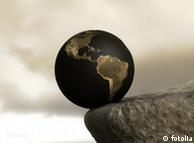Wednesday, October 26, 2011
ΕΚΤ: «Ναι» από Ντράγκι σε μη συμβατικά μέτρα
Στα μη συμβατικά μέτρα περιλαμβάνονται οι παρεμβάσεις με αγορές κρατικών ομολόγων στη δευτερογενή αγορά και η διάθεση απεριόριστης ρευστότητας στις εμπορικές τράπεζες. «Το ευρωσύστημα είναι αποφασισμένο, με τα μη συμβατικά του μέτρα να αποτρέψει την κακή λειτουργία στις αγορές χρήματος και κεφαλαίου», σημείωσε ο κ. Ντράγκι σε ομιλία που έκανε σε συνέδριο στη Ρώμη, προσθέτοντας: «Οι παρεμβάσεις αποτρέπουν την επιδείνωση των ανισορροπιών, αλλά δεν είναι αρκετές από μόνες τους να αντιμετωπίσουν τις βασικές αιτίες (σ.σ.: της κρίσης)».
Θετική η απάντηση στην επιστολή Μπερλουσκόνι
Ο νέος πρόεδρος της Ευρωπαϊκής Κεντρικής Τράπεζας (ΕΚΤ) Μάριο Ντράγκι, χαρακτήρισε «σημαντικό βήμα» την επιστολή του Ιταλού πρωθυπουργού Σίλβιο Μπερλουσκόνι προς την Ευρωπαϊκή Ένωση.
Ο Ντράγκι πήρε μέρος σήμερα στην τελετή που οργανώθηκε στο Μιλάνο για την Διεθνή Ημέρα Αποταμίευσης. «Η επιστολή αυτή περιέχει ένα οργανικό σχέδιο μεταρρυθμίσεων για την οικονομία. Τώρα, οι μεταρρυθμίσεις αυτές πρέπει να εφαρμοσθούν γρήγορα και συγκεκριμένα. Πρόκειται για θαρραλέες παρεμβάσεις, αλλά θα πρέπει να προστατευθούν οι ασθενέστερες οικονομικές τάξεις που πρόκειται οπωσδήποτε να πληγούν», τόνισε ο πρόεδρος της ΕΚΤ, ο οποίος αναλαμβάνει επισήμως τα καθήκοντά του σε τέσσερις ημέρες.
Ο υφυπουργός παρά τω πρωθυπουργό Τζάνι Λέτα, παρών στην εκδήλωση, υπογράμμισε ότι «η άποψη του Ντράγκι σχετικά με την επιστολή της κυβέρνησης είναι σαφώς θετική και όλοι αναγνωρίζουν ότι για την ανάπτυξη της χώρας, η σημαντικότερη επένδυση αφορά στην αξιοποίηση του μοναδικού πλούτου της Ιταλίας, της πολιτιστικής της περιουσίας».
Ο Λέτα αποκάλυψε ότι «από τις Βρυξέλλες ζητήθηκαν κάποιες μικροαλλαγές στην επιστολή Μπερλουσκόνι, οι οποίες θα έχουν ολοκληρωθεί πριν από την έναρξη της συνόδου».
www.kathimerini.gr με πληροφορίες από AΠΕ-ΜΠΕ
Ευρώπη: Στο σταυροδρόμι, μεταξύ αργού θανάτου και φεντεραλισμού
Παγιδευμένη ανάμεσα σε κεντρόφυγες δυνάμεις, η Ευρωπαϊκή Ένωση βρίσκεται σήμερα, εξαιτίας της κρίσης του ευρώ, σε σταυροδρόμι, έχοντας απέναντί της δύο επιλογές: μία αργή αποσύνθεση σε περίπτωση αποτυχίας ή την ευκαιρία μίας επανεκκίνησης του σήμερα εξαντλημένου «ευρωπαϊκού σχεδίου» με μεγαλύτερη δόση φεντεραλισμού.
«Το να αφήσουμε να καταρρεύσει το ευρώ, ισοδυναμεί με κίνδυνο καταστροφής της Ευρώπης», προειδοποίησε πρόσφατα ο Νικολά Σαρκοζί.
Για τους ευρωσκεπτικιστές, η χαοτική κατάσταση του ευρώ εδώ και δύο χρόνια αποτελεί την επιβεβαίωση της ματαιότητας ενός διεστραμμένου σχεδίου. «Για αιώνες θα γίνεται αναφορά στη δημιουργία του ευρώ ως ενός ιστορικού μνημείου στη συλλογική παράνοια», θριαμβολογεί ο υπουργός Οικονομικών της Βρετανίας Ουίλιαμ Χέιγκ.
Παντού στην Ευρώπη η εχθρότητα προς το «ευρωπαϊκό σχέδιο» κερδίζει έδαφος, μαζί με τις τάσεις εθνικής αναδίπλωσης. Εκφράζεται μέσω της ανόδου λαϊκιστικών κινημάτων στην Ολλανδία, τη Φινλανδία και αλλού.
Το κλίμα αυτό ξαναδίνει φτερά στους πλέον αντι-ευρωπαίους βουλευτές του κυβερνώντος Συντηρητικού Κόμματος της Βρετανίας που τολμούν να αψηφήσουν τον πρωθυπουργό τους για να ζητήσουν τη διεξαγωγή δημοψηφίσματος με το ερώτημα της εξόδου της χώρας του από το ευρωπαϊκό μπλοκ.
Περισσότερο από μισό αιώνα μετά τη δημιουργία του, το 1957, το «ευρωπαϊκό σχέδιο» παραμένει πάνω απ' όλα μία οικονομική υπόθεση. Οι προσπάθειες για την μετατροπή του σε πολιτικό εγχείρημα δεν έχουν επιτύχει, με την ευρωπαϊκή διπλωματία να είναι απούσα και την κοινή ευρωπαϊκή άμυνα που απέδειξε την ανυπαρξία της στην υπόθεση της Λιβύης.
«Η Ευρωπαϊκή Ένωση μοιάζει εύθραυστη και εξαντλημένη και ορισμένοι ηγέτες δεν φαίνεται να αντιλαμβάνονται ότι η ευρωπαϊκή ολοκλήρωση μπορεί ακόμη να αποτύχει από αμέλεια ή από εναντίωση. Το αδιανόητο μπορεί σήμερα να γίνει δυνατόν, η έξοδος μίας χώρας από την ευρωζώνη, το τέλος του ευρώ, ακόμη και η διάλυση της Ευρωπαϊκής Ένωσης, δεν αποτελούν πλέον ταμπού, προειδοποιούσε σε πρόσφατη μελέτη του ο Γιάννης Εμμανουηλίδης του European Policy Center των Βρυξελλών.
Αντιθέτως η κρίση χρέους μπορεί να λειτουργήσει ως επιταχυντής της ευρωπαϊκής ολοκλήρωσης. Εχει ήδη αρχίσει να δρα με τον τρόπο αυτόν φέρνοντας και πάλι στο προσκήνιο τη συζήτηση για την Πολιτική Ενωση, η οποία πέρασε στο περιθώριο εδώ και μία δεκαετία μετά την εισαγωγή του κοινού ευρωπαϊκού νομίσματος.
Και εδώ τα ταμπού πέφτουν το ένα μετά το άλλο. Η Γερμανία, η οποία έχει στα χέρια της τα χρηματιστηριακά νήματα, αποδέχεται σήμερα την οικονομική αλληλεγγύη μεταξύ των χωρών τη στιγμή που κάποτε υποστήριζε το σχήμα «ο καθένας για τον εαυτό του» στη διαχείριση των δημοσιονομικών. Και έφθασε μέχρι να συνταχθεί με τη γαλλική ιδέα της συγκρότησης οικονομικής κυβέρνησης της ευρωζώνης.
Ως τίμημα, το Βερολίνο εννοεί να επιβάλει τους δικούς του κανόνες στην υπόλοιπη ευρωζώνη, όπου καλείται να συνεργασθεί με τις μεγάλες χώρες του ευρωπαϊκού νότου τις οποίες δεν εμπιστεύεται, την Ισπανία, την Ιταλία και τη Γαλλία: σιδηρά πειθαρχία ως προς τα ελλείμματα και κεντρικός έλεγχος που φθάνει μέχρι την επιτήρηση των εθνικών προϋπολογισμών.
Η Ευρωπαϊκή Κεντρική Τράπεζα, από την έδρα της στην Φρανκφούρτη, προτείνει μέχρι και την εισαγωγή του θεσμού του ευρωπαίου υπουργού Οικονομικών, ο οποίος θα μπορούσε αρχικά να λειτουργήσει υπό το σχήμα του «υπερ-επιτρόπου» του ευρώ στις Βρυξέλλες, γεγονός που γεννά τη θεμελιώδη ερώτηση: είναι έτοιμη η κοινή γνώμη των κρατών να δεχθεί απώλεια μεριδίων εθνικής κυριαρχίας;
Απειλούμενη με τη σειρά της από την κρίση, η Γαλλία ακολουθεί την πορεία, αφού επί μακρόν έκλινε προς την ιδέα της φεντεραλιστικής Ευρώπης. Ο υπουργός Εξωτερικών της Γαλλίας Αλέν Ζιπέ, εκ των κληρονόμων του γκολικού πνεύματος, τάχθηκε πρόσφατα υπέρ μίας «ευρωπαϊκής ομοσπονδίας».
«Όταν θα έχουμε βγει από την κρίση και θα κοιτάξουμε τη διαδρομή που έχουμε κάνει, θα εντυπωσιασθούμε εκ των υστέρων πολύ από την ικανότητα των χωρών της ευρωζώνης, να προχωρήσουν, με βήμα ταχύ, προς μία μεγαλύτερη ολοκλήρωση», δηλώνει υψηλόβαθμος ευρωπαίος διπλωμάτης.
www.kathimerini.gr με πληροφορίες από ΑΠΕ-ΜΠ
Tuesday, October 25, 2011
AGRICULTURE | 25.10.2011
The world at its limits: Feeding the extra billions
The world's population grows by some 83 million people each year - more than the population of Germany. Even if population growth slows, it is expected that there will be nine billion people on the planet by the year 2050 and ten billion at some point this century.
In order to satisfy their requirements, about 2,400 kilocalories per head would be necessary. Agricultural production, as a result, would have to be doubled or even tripled in the next 40 years.
Given the limited resources of the earth, the question arises as to whether this is even possible. In essence, it is, says Harald von Witzke, professor of agricultural sciences at the Humboldt University of Berlin. But there is one major requirement.
The enormous growth in agricultural production of past decades, Witzke says, is a result in an increase in productivity of the land. Only 20 percent was down to an expansion in the amount of land set aside for agricultural use.
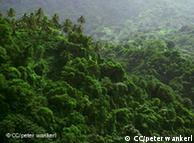 Rain forests could be given protected status, despite the need for more land"In the future we need to have to ensure that there is even greater productivity if we are to succeed in satisfying the rapidly growing demands of people for food. Land area is increasingly becoming a limiting factor for the increase in food production."
Rain forests could be given protected status, despite the need for more land"In the future we need to have to ensure that there is even greater productivity if we are to succeed in satisfying the rapidly growing demands of people for food. Land area is increasingly becoming a limiting factor for the increase in food production."Best land already in use
In fact, some 40 percent of the surface area of the world's land is used for agricultural production. On 16 million square kilometers of that land, grain is grown. Some 30 million square kilometer - an area the size of South America - is used as pasture land. These are the best pieces of land, and they are already being used.
In many parts of the world, there are no significant reserves of land to be set aside for food production - with the developing world being the exception.
According to the United Nations' Food and Agriculture Organization (FAO), only a little more than a third of land that could, in theory, be used is currently being farmed. The conversion of tropical rain forests and peat lands, however, is ruled out for climate protection reasons.
Water, a limiting factor
The increase in productivity itself will be influenced and slowed by various factors. First there are water and energy costs. Globally, agriculture consumes huge quantities of water. It is predictable, according to FAO deputy general director Alexander Müller, that water shortages will become a central theme in the coming years. "We have examined the global distribution of water scarcity and established that, in the areas with high population increase, the water shortages will be at their greatest," said Müller.
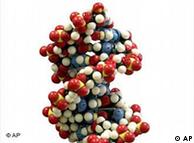 Answers could lie in changing the DNA of species - through breeding or genetic engineering"That means that, of all places, it is those countries where it is absolutely vital that more food is produced, the basic prerequisites are lacking."
Answers could lie in changing the DNA of species - through breeding or genetic engineering"That means that, of all places, it is those countries where it is absolutely vital that more food is produced, the basic prerequisites are lacking."Efficiency is one of the approaches mentioned in a study by an international research team led by Jonathan Foley from the University of Minnesota.
In the future, irrigation and fertilizer should only be used where worthwhile. Plants that need lots of water, for example, should not be grown in dry areas. As for fertilizer use, studies have shown that half of the fertilizer seeps away instead of actually being taken up and used by the plants. It is a process of waste that has also led to the proportion of phosphates and nitrates in the environment to increase – something that results in water pollution. It is a vicious circle that needs to be broken.
New breeds, new lifestyles
To increase current productivity, better crop varieties and growing methods are needed. That way, according to the Minnesota study, global food production can be increased by about 60 percent.
Better varieties on the one hand mean cereals and vegetables with particularly high yields that can thrive even under harsh environmental conditions. On the other hand, staple foods could also be enriched with micronutrients in the future.
This could be achieved through the appropriate breeding or genetic technology.
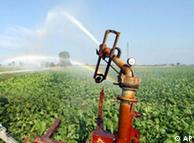 The cost of water supply is one of the greatest limiting factors on arable farmingWorld food security would be easier to ensure if more people ate less meat and other animal products, because animals need to be fed. Production of animal feed competes just as much with the growth of food for people as the growth of plants for biofuels.
The cost of water supply is one of the greatest limiting factors on arable farmingWorld food security would be easier to ensure if more people ate less meat and other animal products, because animals need to be fed. Production of animal feed competes just as much with the growth of food for people as the growth of plants for biofuels.However, the idea that animal products would become less popular appears to be illusory. In fact the opposite trend is apparent, with the consumption of animal products set to rise.
Reserving land for the basics
Scientists have urged that land be set aside for the growth of basic foodstuffs in future. In Latin America, Africa and Eastern Europe, especially, there is good enough land for the yield to be increased substantially. Production of animal feed and biofuels would take place elsewhere.
The production of more meat, eggs and milk products, if it were not possible to produce some of these artificially in the future, would also have an impact on the climate. Currently, 30 percent of greenhouse gas emissions are attributable to agriculture. The effects of CO2 and methane in the atmosphere will affect most those parts of the world where population is growing fastest.
Experts have called for targeted agricultural research and policy, with a specific focus on farming in the developing world.
Currently, 30 percent of greenhouse gas emissions can be put down to agriculture. The effects of more carbon dioxide and methane in the atmosphere will, in fact hit those parts of the world hardest where the increase in population is greatest.
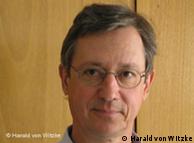 Von Witzke says land contraints and a need for research are a problem in parts of the worldDeveloping world need most attention
Von Witzke says land contraints and a need for research are a problem in parts of the worldDeveloping world need most attentionIt is the inhabitants of developing countries who will suffer under increasing frequencies of drought, flooding, and other natural disasters. That, according to Alexander Müller, from FAO, is something that will create substantial new problems when it comes to feeding the world.
"Every debate about global hunger needs to address the issue of areas of high demand that can be found in developing countries, and that can be found in urban areas and in countries that are only partly economically developed that also have a corresponding potential for market demand," said Müller.
In other words, almost all of these countries are net importers of food, although they usually do not have enough money to buy food on the world markets.
The need to concentrate on the developing world is also stressed by the Berlin scientist von Witzke.
"The worst thing about all of this is that these countries only have very rudimentary agricultural research systems in place and so it is very difficult for farmers in these countries to adapt to climate change," said von Witzke.
More agricultural research
Experts have called for targeted agricultural research and policy, with a specific focus on farming in the developing world.
 Less meat consumption would help, but the trend is in the opposite directionAs a proportion of development aid, agriculture received 18 to 19 percent in 1980, compared with only 3.5 percent in 2007. There is a lack of advice on better farming methods, training, affordable credit, good seeds and information on opportunities for farmers to sell what they grow.
Less meat consumption would help, but the trend is in the opposite directionAs a proportion of development aid, agriculture received 18 to 19 percent in 1980, compared with only 3.5 percent in 2007. There is a lack of advice on better farming methods, training, affordable credit, good seeds and information on opportunities for farmers to sell what they grow.As a result, almost half of the total harvest in developing countries is lost because food is not properly harvested, transported and stored and there are not enough opportunities to add value by further processing.
Then there are also many conflicts. If countries cannot fulfill their potential because they are torn by civil war or due to bad governance, there is little that can be done to improve agriculture and resultant yields.
How many people can the earth support? That there is a recipe for world food security is something experts agree does not exist. While the planet should be able to feed ten billion people in theory, with the growth of population highest where food security is most precarious, this may not happen in practice.
Author: Sabine Kinkartz / rc
Editor: Sarah Steffen
Editor: Sarah Steffen
dw
Monday, October 24, 2011
Subscribe to:
Comments (Atom)
